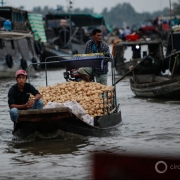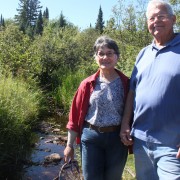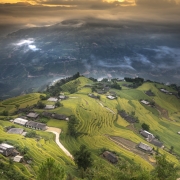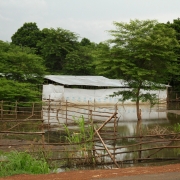Volunteer Network Rescues Small Alabama Water System with Operator under Quarantine
Water utilities are concerned that the new coronavirus will lead to staffing shortages.

Photo © J. Carl Ganter/Circle of Blue
By Brett Walton, Circle of Blue
The call for help came to the Alabama Rural Water Association on March 19.
Shana Ray, mayor of the tiny town of Gordon, had learned that the town’s water system operator was in self-quarantine because of potential exposure to the new coronavirus during a vacation in Hawaii.
A member of Gordon’s maintenance staff was acting as a stop-gap solution, checking chlorine levels and ensuring that the system did not break down. But to comply with state and federal rules, Gordon needed something it did not have at the moment: a certified operator to run the water treatment plant.
Ray’s request eventually reached the desk of Robert White, executive director of the Alabama Rural Water Association. The association is an indispensable resource for small towns like Gordon, and typically provides technical support and training.
During the coronavirus outbreak, the association is also acting as a matchmaking service for water utilities that are short-staffed because of illness and quarantines. It is one of several rural water associations around the country that are compiling lists of volunteer water systems operators who can temporarily fill in during the pandemic emergency.
The potential for staffing shortages in the coming weeks and months is the top concern of water utility leaders, according to a survey conducted by the American Water Works Association.
The New Orleans Sewerage and Water Board is one of the largest utilities so far to acknowledge a staffing problem connected to the outbreak. The board announced this week that it does not have enough workers to read meters. Water bills will instead be estimated.
In Gordon’s case, White acted quickly. He found an available certified operator for the town who lives in the area.
“He had someone in contact with us the next day,” Lorie Mock, the town clerk, told Circle of Blue.
White said that, to his knowledge, Gordon is the only water utility in the state that has needed a temporary operator because of a coronavirus quarantine.
For many water utilities, this is new terrain. Emergency planning for the coronavirus runs counter to emergency planning for other disasters, White explained. After a hurricane, for instance, volunteers rush into a town to fix broken pipes and bail out water. With the virus, though, the advice is to stay away and keep social distance. “It’s something we typically don’t encounter in other scenarios,” White said.
Maintaining Distance
Wedged into the southeastern corner of Alabama, near the borders of Florida and Georgia, Gordon is home to 364 people, according to Mock.
Ray told Circle of Blue that Gordon is going to keep the temporary operator indefinitely. More than 80 percent of the town’s residents are senior citizens, who are more susceptible to Covid-19, the disease caused by the coronavirus. As a precaution, Ray has already closed the town’s senior center and is holding Town Council meetings via conference call.
Ray said that the town’s usual water operator lives in Blakely, a larger community in Georgia about 25 miles northeast of Gordon. Blakely has recorded one death from Covid-19 and instituted a shelter-in-place order on March 24. The operator was showing symptoms but tested negative for Covid-19, Mock said.
In the meantime, Gordon will continue with the temporary operator provided by Alabama Rural Water Association. Mock views the association as a life-saver that helped keep the water system operating without interruption.
“I can’t say enough good things about them,” Mock said.
Brett writes about agriculture, energy, infrastructure, and the politics and economics of water in the United States. He also writes the Federal Water Tap, Circle of Blue’s weekly digest of U.S. government water news. He is the winner of two Society of Environmental Journalists reporting awards, one of the top honors in American environmental journalism: first place for explanatory reporting for a series on septic system pollution in the United States(2016) and third place for beat reporting in a small market (2014). He received the Sierra Club’s Distinguished Service Award in 2018. Brett lives in Seattle, where he hikes the mountains and bakes pies. Contact Brett Walton












Leave a Reply
Want to join the discussion?Feel free to contribute!